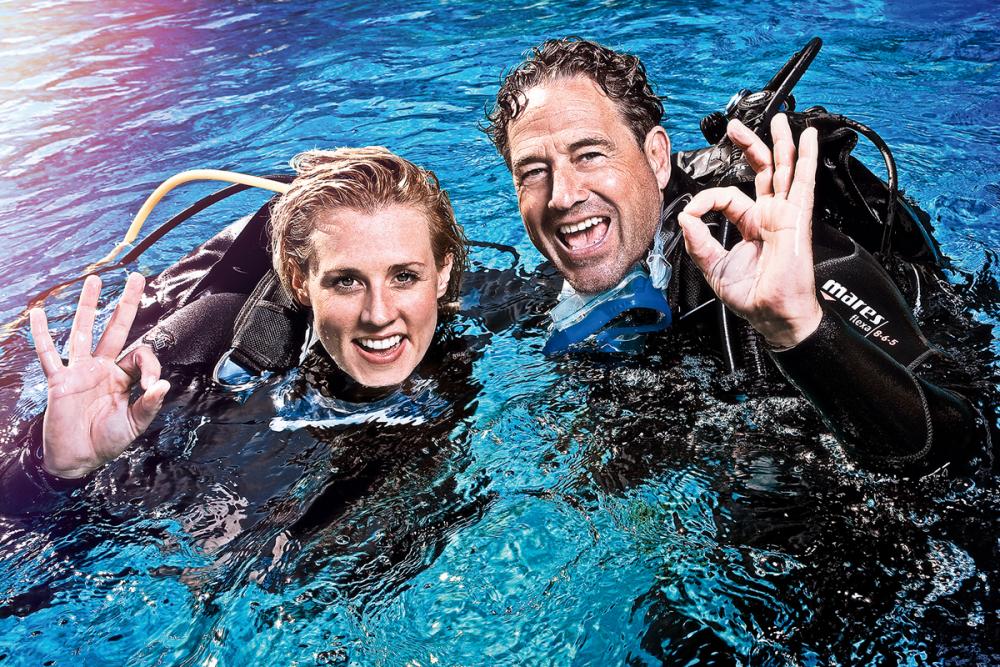
Is Becoming a Dive Instructor the Best Job in the World?
An Honest Look at the Pros and Cons
Are you bored of work and searching for something more meaningful? Tired of spending your days behind a desk, staring at screens, and commuting through traffic? For ocean lovers, one career path often comes to mind: becoming a scuba diving instructor.
It’s the dream of trading office walls for coral walls, corporate suits for wetsuits, and deadlines for dive lines. At first glance, it might look like the ultimate “get paid to travel” lifestyle.
But is it really that simple? What’s it actually like to work as a professional dive instructor? And is it really “the best job in the world”?
Lets take a deep, honest dive into the reality of the profession. Lets explore the many reasons why being a dive instructor is extraordinary, whilst also giving you a realistic view of the challenges and commitments. Whether you’re already planning your Instructor Training Course (ITC) or simply daydreaming about escaping the office, this guide will help you get inspired—and prepared—for one of the most rewarding career paths you could ever imagine.
Why Working as a Dive Instructor is Awesome
1. You Spend Time in the Water Every Day
If you love the ocean, becoming a dive instructor is one of the most natural career choices. Your “office” is the reef, the wreck, the blue water, or the kelp forest. Instead of sitting in meetings, you’ll be hovering weightless among schools of fish, teaching new divers how to take their first breaths underwater.
Few professions allow you to immerse yourself—literally—in your passion every day. And the beauty is, you’re not just diving alone. You’re sharing the experience with enthusiastic students and divers who are equally captivated by the underwater world. That energy is contagious and makes every dive day exciting.
2. You Get to Know Your Favourite Dive Sites Like No One Else
As a casual recreational diver, you might visit a dive site once or twice and move on. But as an instructor, you develop an intimate knowledge of local reefs, walls, wrecks, and lagoons. You’ll see how sites transform through the seasons, which marine animals arrive at what times of year, and where to find hidden treasures that only locals know.
For example, you might learn that a particular cleaning station is buzzing with manta rays every September, or that a local wreck is home to a resident turtle that greets you on morning dives. This insider knowledge not only makes your own diving richer, but also allows you to deliver unforgettable dive experiences for your students.
3. You Change People’s Lives
Ask any dive instructor what they love most, and you’ll hear one common answer: seeing the joy on a student’s face when they first breathe underwater. That magical moment is unforgettable. As an instructor, you’re the one guiding people into a whole new world.
Some of your students will be nervous, even fearful, at the start. Helping them overcome their anxieties, build confidence, and succeed is incredibly rewarding. Many divers say their Open Water course was a turning point in their lives, and you get to be the person who made it possible.
Even experienced divers seeking new challenges—such as advanced, rescue, or specialty courses—will look to you for guidance. The advice, encouragement, and knowledge you share will stay with them for a lifetime. Few jobs offer this kind of positive, lasting impact.
4. You Can Live and Work in Beautiful Places
Yes, tropical islands with palm-fringed beaches are popular destinations for dive professionals. But the options don’t stop there. Dive instructors work in alpine lakes, inland quarries, vibrant coastal towns, luxurious liveaboard vessels, bustling metropolitan harbours, and even polar expeditions.
Want to live in Thailand or the Maldives? No problem. Dreaming of diving the Great Barrier Reef, Mexico’s cenotes, or Egypt’s Red Sea? Go for it. The flexibility of this career is extraordinary. And unlike many jobs, your credentials are recognized worldwide. Your diving passport opens doors across the globe.
5. You Can Tailor Your Career to Your Passion
Diving is diverse: reefs, wrecks, caves, technical diving, freediving, marine science, underwater photography, conservation projects, and more. As a dive instructor, you’re not locked into one path—you can follow your passion and specialize.
Love wreck diving? Become a wreck specialty instructor. Passionate about conservation? Lead reef surveys and citizen science projects. Fascinated by deep or technical diving? Train as an Extended Range instructor. The diving industry rewards curiosity and continuous learning, so you can craft a career that never feels monotonous.
6. You Contribute to Ocean Conservation
One of the greatest privileges of working as a dive instructor is becoming an ambassador for the ocean. Every diver you train is another person who understands, appreciates, and protects the marine environment.
You’ll teach students about buoyancy control to avoid damaging reefs, explain why reef-safe sunscreens matter, and encourage sustainable dive gear choices. Many instructors also volunteer for conservation programs—reef monitoring, coral planting, debris clean-ups. In this way, your job isn’t just about guiding dives. It’s about making a tangible difference for the planet’s oceans.
7. You Work with Like-Minded People
Unlike many traditional workplaces where colleagues bond over coffee breaks and office gossip, dive instructors are surrounded by people who share their passion. Your co-workers will be fellow divers, conservationists, and adventurers. Your students are people who want to be there, excited to learn from you.
This creates a community where work doesn’t feel like “work.” Instead, it feels like a lifestyle built around passion, camaraderie, and shared experiences. It’s not uncommon for instructors to form lifelong friendships—or even families—with people they meet through diving.
8. You Get Paid to Do What You Love
Perhaps the ultimate reward: you earn money for doing what you’d happily do for free. While it’s true that dive instructors aren’t typically millionaires (we’ll cover that in the “cons” section), the value isn’t just financial. It’s the freedom to live simply, travel widely, and immerse yourself in what brings you joy.
Many instructors find that their cost of living in dive destinations is low. They don’t need lavish luxuries; the ocean provides all the richness they need. And many end up saving money without even trying—because their entertainment istheir job.
Things to Be Aware Of When You Become a Dive Instructor
Of course, no career is without challenges. For all its magic, being a dive instructor is also demanding. Here are the realities to be prepared for:
1. You Need to Be Fit and Healthy
Scuba instructors aren’t required to be Olympic athletes, but basic physical fitness is essential. You’ll be carrying tanks, lifting gear, climbing in and out of boats, and spending hours in the water. A strong, healthy body helps prevent injuries and ensures you can look after your students safely.
Building core strength, stretching regularly, and maintaining overall health will help you stay injury-free and energized. Many instructors also emphasize the importance of proper sleep, hydration, and recovery—especially during busy seasons.
2. You Can Get Very Cold
Even in tropical waters, spending multiple dives per day in and out of the water takes its toll. Instructors often feel the cold before their students do, because they’re diving so frequently.
The solution? The right exposure protection. A well-fitting wetsuit or drysuit, warm surface clothing, and good nutrition make all the difference. Staying fueled with snacks, staying hydrated, and listening to your body are vital for keeping warm and safe.
3. Motion Sickness Happens
Boat diving is part of many instructors’ daily routine. Even if you’ve never been seasick, motion sickness can sneak up on you. Some instructors are completely unaffected; others struggle seasonally or when conditions change.
Fortunately, remedies exist. From natural options like ginger to doctor-prescribed medications, it’s manageable. Experienced instructors also have tricks: staying hydrated, avoiding heavy meals, and always facing the horizon.
4. You Won’t Earn a Fortune
It’s true: most dive instructors don’t drive luxury cars or own penthouses. But money is relative. In many parts of the world, instructor wages provide a comfortable, simple lifestyle with enough to cover living expenses and occasional travel.
The key is entrepreneurial thinking. Many instructors boost their income by teaching specialties, running workshops, freelancing with multiple dive shops, or even opening their own dive businesses. Some diversify into photography, guiding, or equipment sales. If you combine passion with creativity, the earning potential grows.
5. It’s Hard Work
Behind the smiles, photos, and social media posts of instructors living “the dream,” there’s no denying the hard work involved. Long hours, weekend work, and early mornings are standard. Courses sometimes add last-minute students. Equipment failures, weather changes, or anxious divers can all add stress.
Patience, stamina, and professionalism are essential. You’ll need to stay positive and supportive, even when you’re tired. But here’s the truth: while the job is demanding, it’s rarely dull. Every day is different, and the rewards far outweigh the challenges.
The Verdict: Is It Worth It?
Yes, working as a dive instructor is hard work. Yes, you’ll face physical demands, unpredictable seas, and modest paychecks. But for those who love the ocean, the lifestyle, the community, and the sense of purpose, it’s hard to imagine a more fulfilling career.
Most instructors will tell you they wouldn’t trade it for the world. The combination of adventure, teaching, conservation, and global travel is unmatched. While others count down to weekends and retirement, you’ll already be living your dream every single day.
Taking the First Step
If this sounds like the career you’ve been waiting for, the next step is training. Many divers begin by taking advanced specialty courses such as SSI’s Science of Diving or Divemaster programs to build their knowledge before committing to an Instructor Training Course.
From there, you’ll gain teaching skills, leadership training, and the credentials to start working anywhere in the world. Whether your goal is to spend a year abroad or to build a lifelong career, becoming a dive instructor is a pathway to freedom, fulfillment, and adventure.
Final Word: Dive In!
So, are you ready to trade office walls for coral reefs? To inspire others, protect the ocean, and build a lifestyle around passion? Becoming a dive instructor might just be the best decision you’ll ever make.
🌊 Live your dream—click here to start your diving career today.
Share
